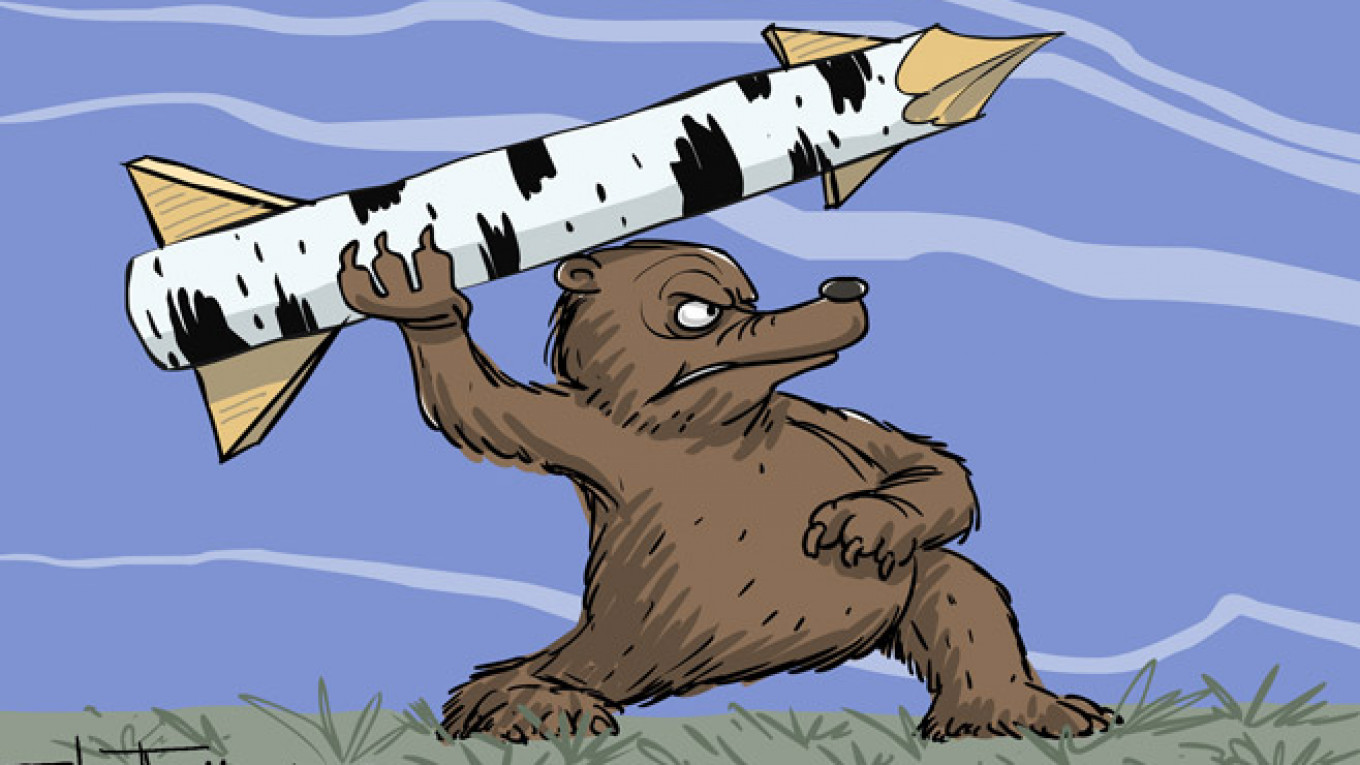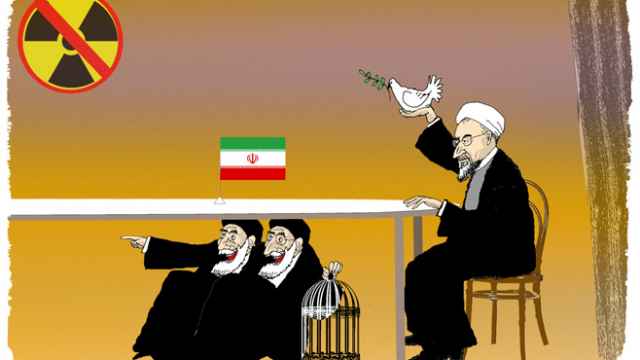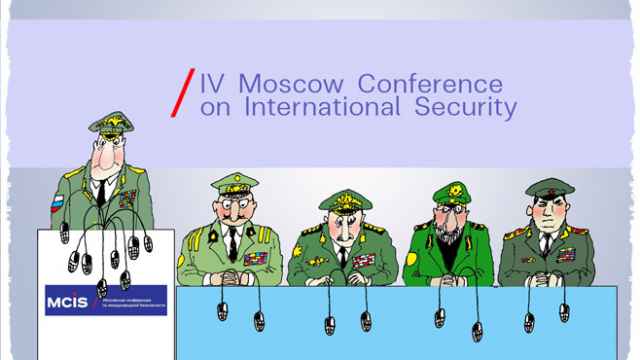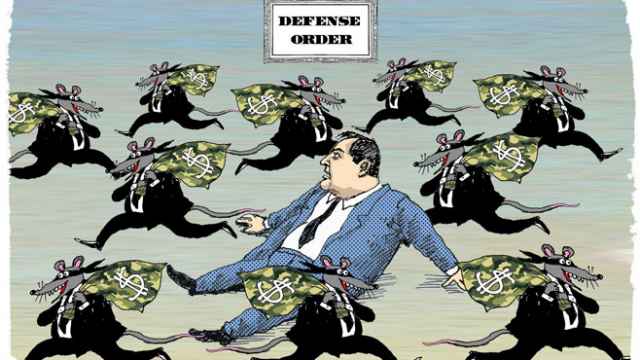To paraphrase a famous expression, "Be careful what you complain about — or you might end up with something to really complain about."
Moscow officials have long complained that the international community did not give Russia the attention it deserved. "Those insidious Westerners ignore Russia's wonderful foreign policy initiatives," they grumbled, "because they are unable to come up with anything half as brilliant themselves."
But all of that changed almost overnight. Now Russia is once again firmly in the limelight — right alongside Ebola and the Islamic State.
A perfect illustration was the latest annual forum in Tallinn named in honor of that country's second president, Lennart Meri, and devoted to the most pressing international problems. Russia's outstanding successes in Crimea and the Donbass made it the primary focus of the entire conference. President Vladimir Putin figured in one way or another in almost every discussion panel.
Their headings speak for themselves: Is Home Still a Castle? Lessons From Ukraine for the Baltic Arena; Russia's Energy Weapon: Blunted or Still Potent?; The World According to Putin, Putin According to the World; The Power of Narratives: An Unwinnable War Over the Truth?; Ukraine: Is There a Will? Is There a Way?; European Policies Revised: Neighbors Left Out in the Cold?; Transatlantic Relationship: Who Will Defend Europe?; Sanctions: A Sword or a Boomerang?; Russian Society: Fertile Ground for a Noxious Regime?
Every one of those panel discussions concerned Russia. For three days, leading world experts discussed the Russian threat. Can NATO defend the Baltic states from Russian aggression? Is there a way to counter the unrestrained campaign of lies on Russian television? Will Putin respond to Western leaders' refusal to attend Victory Day celebrations in Moscow by renewing the war in Ukraine?
Representatives from Poland and the Baltic states set the tone at the conference — and they occasionally went overboard with their comments. For example, Marshal of Poland's Sejm parliament Radoslaw Sikorski, stated with full confidence that Russia's military doctrine contains a provision for a pre-emptive nuclear strike — a blatant falsehood.
However, I cannot blame Poland and the Baltic states for their zeal. They had insisted for years that Moscow posed a military threat. However, the "older" European states dismissed their fears, arguing that those regions have painful histories with Russia and that they position themselves as the "front line" in any confrontation with Russia so as to ensure that the "larger" NATO states do not lose interest in them. Now, after Crimea and Donbass, it turns out those fears were not groundless.
On the same day the conference ended, Russia's state-controlled television aired a documentary informing the country's fawning population of Putin's unprecedented successes as national leader.
Let's assess the results of these "victories" under Putin. The people of what Moscow has long hailed as its "brotherly neighboring state" now view Russia as an unmitigated aggressor. The Ukrainian representatives at the Tallinn conference were unanimous on this point.
Now Moscow will have to wait decades before it can even broach the subject of integrating Ukraine and Russia in any form. Conference attendees repeatedly called on NATO to abandon its previously declared principles and immediately bring Ukraine into the alliance, arguing that it is the only way to stop Russian aggression.
Recall that Moscow justified its decision to seize Crimea and start a war in Ukraine as the best way to prevent NATO forces from nearing Russia's borders. Now that policy has only intensified NATO's presence and hastened its approach.
Russia had just as fiercely objected to the appearance of NATO troops in the Baltic states. However, Moscow's escapade in Ukraine prompted NATO leaders to decide at their most recent summit in Wales to rotate NATO forces through Lithuania, Latvia and Estonia.
In doing so, they followed the example of Moscow when it announced that, by positioning contingents of thousands of soldiers near the Ukrainian border, it was not violating the Vienna Document — the last agreement still in force that seeks to maintain some measure of trust and transparency between Russia and the West on military matters.
Moscow argued that it was simply conducting uncoordinated maneuvers of various units, and was therefore under no obligation to inform NATO in advance or invite foreign observers.
However, Estonian politicians at the conference took this logic one step further. Estonian President Toomas Hendrik Ilves said the basic NATO-Russia agreement does not preclude the alliance from permanently deploying troops to countries bordering Russia, and that to contend otherwise is to falsely interpret that document.
I suspect it is only a matter of time before the NATO leadership comes to agree with the Estonian position. In fact, an even more revolutionary idea arose at the conference. Participants suggested that the United Nations strip Security Council members found guilty of direct aggression of their veto power and possibly punish them for their crimes.
Of course, it is easy enough to ignore everything that participants said at the Tallinn conference. After all, those notorious Russophobes in the Baltic states will say anything in their eagerness to lash out at this country.
However, I suspect that this was only the first wave of angry response over Russia's actions in Ukraine, and that others will soon follow. At some point, international organizations will adopt the same attitude when reaching decisions concerning Russia.
Alexander Golts is deputy editor of the online newspaper Yezhednevny Zhurnal.
A Message from The Moscow Times:
Dear readers,
We are facing unprecedented challenges. Russia's Prosecutor General's Office has designated The Moscow Times as an "undesirable" organization, criminalizing our work and putting our staff at risk of prosecution. This follows our earlier unjust labeling as a "foreign agent."
These actions are direct attempts to silence independent journalism in Russia. The authorities claim our work "discredits the decisions of the Russian leadership." We see things differently: we strive to provide accurate, unbiased reporting on Russia.
We, the journalists of The Moscow Times, refuse to be silenced. But to continue our work, we need your help.
Your support, no matter how small, makes a world of difference. If you can, please support us monthly starting from just $2. It's quick to set up, and every contribution makes a significant impact.
By supporting The Moscow Times, you're defending open, independent journalism in the face of repression. Thank you for standing with us.
Remind me later.







